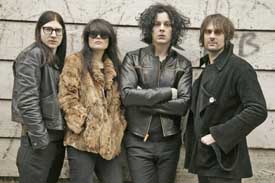
What does it take to be a guitar god? Inventiveness, stature, tone and a great deal of chops.
Jack White has figured this formula out. Best known as the lead singer and guitarist for The White Stripes and The Raconteurs, White has effectively fit himself into the design of a modern, true-to-life guitar hero.
But, this — among other reasons — is exactly why White’s newest band, The Dead Weather, does not work. Here, White sits on the drums, almost completely removing himself from his main instrument and allowing the band’s sophomore album, Sea of Cowards, to quickly settle into a sludgy mess of riff-based boredom.
Of course, this isn’t meant to put down the other members of the band. The Dead Weather is also composed of vocalist-guitarist Alison Mosshart (The Kills), guitarist-organist Dean Fertita (Queens of the Stone Age), and bassist-guitarist Jack Lawrence (The Raconteurs).
Each member has made interesting and challenging records in the often lackadaisical rock genre. For all intents and purposes, The Dead Weather can be looked at as a lesser super-group.
Sea of Cowards, however, falls prey to the problems of The Dead Weather’s first album, Horehound, which was released less than one year ago. Instead of sounding like a coherent effort from a well-planned band, most of this record’s content gives the impression of a lazy jam session where distortion is more important than melody.
The group can’t seem to stop sounding like an impromptu set — song after song on Sea of Cowards prescribes to the idea that no thought has to go into a riff. Heavy guitar and bass licks are repeatedly hammered into listeners’ heads, but even after a cursory listen, most people will be able to see right through the fuzz and realize they aren’t listening to something particularly captivating.
Take “Hustle and Cuss,” where a repetitive bassline drags the track along like a rickety coffin to its own grave. Mosshart speak-sings the title of the song over and over like a bluesy queen of the damned. Sure, it’s a musty, dirty little track, but it’s also uninteresting. It would be considered filler on any of these players’ other projects.
This trend continues in multiple places on the album, and one can’t help but wonder why the group didn’t wait more than a year after Horehound to release Sea of Cowards. Even if the artists felt creative sparks among one another, it doesn’t translate well on the album.
There are instances on the album where the riffs do work, but they are few and far between and dragged down by all the other tracks surrounding them.
“Jawbreaker” is a pounding, grimy affair that builds nicely during its short-lived existence into a climax that has more to do with feedback and aggression than songwriting, but it is effective nonetheless.
Unsurprisingly, the songs are mixed together as if they were a live jam, with tracks feeding into one another. In many instances, this makes it impossible for listeners to tell when one song has ended and another has begun.
It’s a trick that often makes the worst songs on the album sound like parts of the better ones. “The Difference Between Us,” which is based around a revolving organ arpeggio that is as sinister as it is catchy and that builds to a startling crescendo mid-song, could easily be a later single from the album.
For an artist who has stimulated so much creativity, Jack White’s newest band doesn’t do much for the senses. Taking The White Stripes as a happy medium and The Raconteurs as that medium’s good-natured pop cousin, The Dead Weather is the other side — a dark, dirty and destitute evil twin.
All of that is meaningless if the music being produced is a boring near-disaster, and for White, a waste of ample talent. On the next album, which could come sooner than listeners think, perhaps the band should focus less on having fun and more on writing music.
RATING: 2 stars out of 5
zberman@umd.edu



